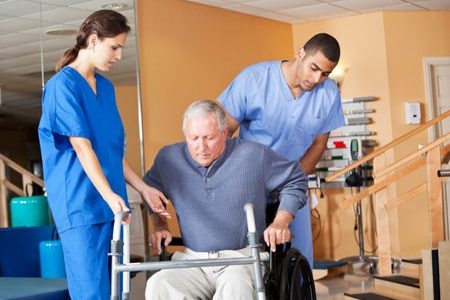Patient care technician requirements often involve a variety of medical knowledge and skills. That’s because a patient care technician plays a key role in a patient’s health outcomes. A PCT is a versatile member of a healthcare team. That’s because they can be found working with diverse patient populations in a variety of settings. You’ll need to gain a well-rounded education before you can become a PCT. Some of the requirements include knowing how to draw blood, how to record and monitor vital signs, and how to assist and administer various tests such as EKGs.
To succeed in a career as a PCT, you’ll need to learn how to handle different issues that may arise with a patient. This could be anything from a heart attack to a broken bone. Overall, the work of a PCT is a mix of basic nursing skills, phlebotomy, and providing excellent patient care.
Are you feeling overwhelmed after looking at patient care technician education requirements? It may look complicated, but you can start working as a patient care technician in a year or less! In fact, some education programs take only a few months.
To get started in your PCT career:
- First, explore what a PCT does to make sure it’s the right occupation for you and your interests
- Research patient care technician education requirements for where you plan to work
- Discover what certifications (if any) you will need to start your career
- Explore PCT programs to find the best option for your career goals
Get started with a Patient Care Technician program by enrolling at Training Direct
What will you have to do as a PCT?
To be a successful patient care technician, you’ll need to bring your empathy to work every day! PCTs work closely with patients in vulnerable situations. They may help patients with medication, treatments, and daily tasks.
The day-to-day job duties of a patient care technician may include:
- Helping a patient get dressed
- Tracking and recording a patient’s vital signs
- Helping patients move from one place to another
- Administering EKGs
- Drawing blood
- Ensuring patient areas are clean and organized
- Communicating patient developments and symptoms to nurses and doctors
- Sanitizing and maintaining a clean environment
The daily work of a patient care technician also depends on the state you work in. PCTs in most states track vital signs (blood pressure, temperature, pulse, and more). They also help patients with mobility and medication. PCTs in some states may also perform basic medical procedures such as drawing blood. They also may be responsible for taking electrocardiograms (EKGs) and collecting other specimens for testing at a laboratory or hospital. In other states, those tasks are left up to registered nurses or licensed practical nurses.
Your work routine will also depend on where you work. Flexibility in your work environment is a big reason why many people choose a PCT career. Once you meet patient care technician requirements for your state, you can apply to work in:
- Hospitals
- Rehabilitation Facilities
- Nursing Homes or Long-term Care Facilites
- Surgical Centers
- Correctional Facilities
- Urgent Care Centers
- And more
No matter where you get a job, when you work as a PCT, you’ll spend most of your day helping patients with daily activities. This includes helping them dress, eat, and use the restroom. PCTs also help patients with any other tasks that might be challenging because of their current injury or illness. That might include hand-eye coordination, doing up buttons, or brushing teeth.
Patient care technician education requirements
A good PCT program teaches you skills for adaptability, communication, and problem solving, in addition to traditional medical care coursework. During your training to become a PCT, you may have the opportunity to dive into topics like:
- Medical anatomy
- Infection control
- Taking and recording vital signs
- Venipuncture and capillary collection procedures
- Patient preparation for the EKG
- Analyzing and interpreting different waves and cardiac rhythms
- And more
You’ll need to know a lot about these subjects to work as a patient care technician in most states.
A patient care technician education program is a great way to learn if this work is right for you. A few more questions to ask yourself as you think about becoming a patient care technician:
- Am I okay around needles and/or the sight of blood? If bodily fluids make you woozy, this may not be the best occupation for you!
- Does the proposed coursework for becoming a PCT interest me?
- What else would I need to do to start my PCT career in my area?
Certifications to begin your career!
Certifications are usually not mandatory. But you may discover many employers prefer PCTs to hold at least one. Some common certifications for PCTs include:
- Certified Patient Care Technician/Assistant (CPCT/A)
- Certified Phlebotomy Technician (CPT)
- Certified EKG Technician (CET)
The focus and scope vary for each certification. As you explore PCT education requirements, consider which of these certifications appeal to your interests. You can then browse programs to make sure you find the right fit.
Keep in mind that certifications may vary. The training program/school you select should be able to provide you with more information about what opportunities you may have in regards to pursuing certification once you finish your training.
Launch your career with Training Direct’s PCT program!
For people interested in launching a PCT career in Connecticut, Training Direct offers a program for students in Danbury and Bridgeport! It aims to cover various topics to help students fulfill patient care technician education requirements required when they pursue certification and employment. Training Direct’s Patient Care Technician program is designed to teach you key skills in:
- Nurse Aide Training
- Phlebotomy Technician Training
- EKG Technician Training
Coursework in each area takes roughly 2-4 weeks to complete. Exciting course options include:
- The Cardiovascular System and the Human Body
- Patient Preparation for the EKG
- Anatomy
- Effective Communication and Documentation Skills
- Infection Control
- Understanding HIPAA
- And more!





